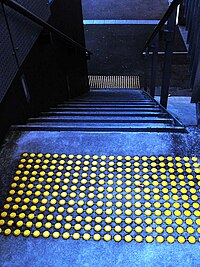
Photo from wikipedia
The aim of the present study was to investigate the effects of mastication on somatosensory processing using somatosensory-evoked potentials (SEPs). Fourteen healthy subjects received a median nerve stimulation at the… Click to show full abstract
The aim of the present study was to investigate the effects of mastication on somatosensory processing using somatosensory-evoked potentials (SEPs). Fourteen healthy subjects received a median nerve stimulation at the right wrist under two conditions: Mastication and Control. SEPs were recorded in five sessions for approximately seven minutes: Pre, Post 1, 2, 3, and 4. Subjects were asked to chew gum for five minutes after one session in Mastication. Control included the same five sessions. The amplitudes and latencies of P14, N20, P25, N35, P45, and N60 components at C3', frontal N30 component at Fz, and P100 and N140 components at Pz were analyzed. The amplitude of P45-N60 was significantly smaller at Post 1, 2, 3, and 4 than at Pre in Control, but not in Mastication. The latency of P25 was significantly longer at Post 2, 3, and 4 than at Pre in Control, but not in Mastication. The latency of P100 was significantly longer at Post 2 than at Pre in Control, but not in Mastication. These results suggest the significant effects of mastication on the neural activity of human somatosensory processing.
Journal Title: Neuroscience Research
Year Published: 2017
Link to full text (if available)
Share on Social Media: Sign Up to like & get
recommendations!